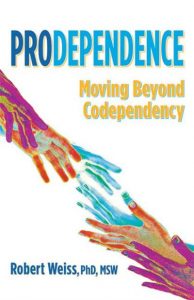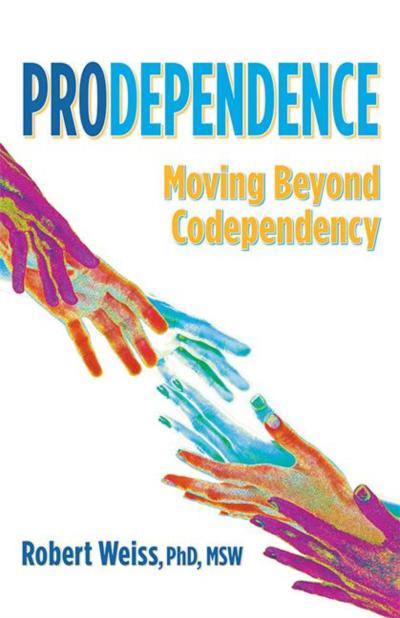
Dr. Robert Weiss is widely known for his therapeutic work and his books about addiction, in particular sex, porn, and love addiction. His latest book, Prodependence: Moving Beyond Codependency, is an extension of these efforts, focusing on the ways in which therapists (and the public) view and treat not just addicts, but spouses and family members of addicts.
For more than three decades, the primary treatment and recovery model for loved ones of addicts has been codependence, which typically labels efforts to help an addicted or otherwise struggling loved one as enmeshed and enabling. Then, the caregiving family member is identified as codependent and told that he or she needs to “detach with love” or nothing will ever get better.
To a person who loves and cares for an addict, the codependence model feels like they’re being blamed and shamed for someone else’s problem. And that doesn’t make a lot of sense to them.
With Prodependence, Dr. Weiss steers us in a new direction—celebrating rather than denigrating the desire to stay connected with and to care for a struggling loved one, even in the face of addiction. Weiss asks: “If I love someone with a physical illness or a disability by helping that person and the rest of my family, even to my detriment, I’m a saint. But if I love and care for an addict in the same way, I am called out as enmeshed, enabling, controlling, and codependent. Why is there a difference?”
That seems like a reasonable question, to which there is no real answer.
To remedy the situation, Dr. Weiss suggests a new model, which he calls prodependence. About this approach, he says, “To treat loved ones of addicts using prodependence, we need not find that something is ‘wrong with them.’ We can simply acknowledge the trauma and inherent dysfunction that occurs when living in close relationship with an addict, and then we can address that in the healthiest, least shaming way.”
Interesting, Dr. Weiss’s approach to treatment, in terms of the work that loved ones of addicts need to do, is similar to the work done in codependency treatment—an improved focus on self-care and setting better boundaries with the addict (and others). The difference is in how therapists and caregiving loved ones think about and talk about the situation.
Codependence imposes a pseudo-pathology that blames and shames the caregiving loved one; prodependence understands the caregiving loved one is in the midst of an ongoing crisis and doing the best that he or she can, given the circumstances.
Prodependence says that loving and caring for an addict is not a pathological behavior, even if that love and care occasionally veers off course into enmeshment and enabling. Rather than pathologizing loved ones of addicts, prodependence says we should applaud them for their efforts while helping them love and care for the addict in ways that are less stressful to them and more helpful to the addict and his or her recovery.
This is a refreshing approach. Any person who has ever been labeled as codependent and told that he or she needs to detach with love knows how little sense that label and that suggestion make. As human beings, we can’t walk away from a person we love any more than we can stop breathing. It’s just not natural. Do we sometimes need to take better care of ourselves while we help our addicted loved one? Almost certainly. Would setting and maintaining better boundaries with the addict be helpful to us and to the addict and his or her recovery? Without doubt. But that doesn’t mean we need to walk away and leave the addict to sink or swim without us.
Prodependence recognizes and accepts (and even celebrates) these facts. In so doing, it presents an evolved prism through which therapists and caregiving loved ones can examine, evaluate, and improve not just relationships affected by addiction, but relationships in general.
Prodependence: Moving Beyond Codependency is recommended (maybe even required) reading for all recovering addicts, all spouses and family members of addicts, and all therapists who work with addicts and family members of addicts.



1 Comment
I’m a gratefully recovering CoDependent. I’ve been out of recovery circles ever since I married . My wife (the better off of CoDependency, also codependent) and I are struggling right now. We met at a CoDA meeting back in 1992. I maintained my addiction to recovery in relationships, as well as she. Recently I came across my literature from CoDA. After refreshing myself by re-reading the stuff i had found; I came to the realization that I have slipped into my old codependent patterns. I feel a lot of resentment over this. I now realize that I need to get back to meetings. I had a Sponsor, but, sadly he has passed away from our mortal realm. Rght now I’m drowning again in an ocean of stinking thinking about my predicament. I Need a meeting badly. The need for a comprehensive meeting list for my area is sparse. Most meetings are quite some distance away from my general vicinity. I’m in Therapy, too. I need some men to reach out to me so I can re-start my. buddy list (Unfortunately my old list was not with my literature). I ask now for some one to come forward in a sponsorship direction. If you have the time, I have the need. Thanks for listening. Jim P. (216)-409-1942. Cleveland, Ohio. 44135.